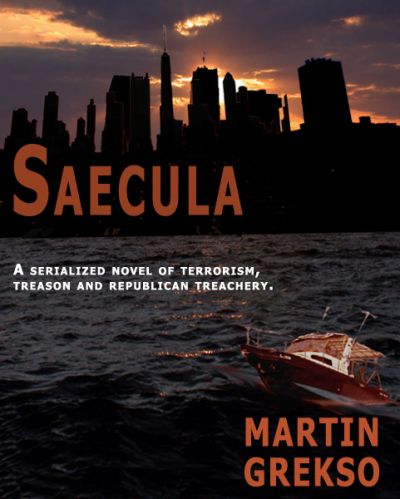
2008
Episode
14
The
Brit
Previously in "Saecula:” An elite Republican
cabal conspires to steal the
2008 presidential election. Confronted with
devastating poll numbers
from the disasteroud Islamic War, it sets
in motion the ultimate October
Surprise, a terrorist attack on the nation.
When Tom Bishop’s ops director, Vincent, had instructed
Willie to organize the attack by a small
nondescript boat that could motor up the Chesapeake
Bay without attracting the attention of the
American Coast Guard, he was initially stymied.
The boat could be no larger than 25 feet. As a coastal
rather than an ocean-going vessel, it would not
be as susceptible to Coast Guard inspection. The prospect
of smuggling five men carrying botulinum into
North America by plane or ship and having them work
their way to Norfolk in order to rent such a boat
was high risk with low probability of success. Even if
he could get them into the Caribbean, an easier
venue for access, they would require at least a 40-foot
boat for the crossing, or chance a 25-footer and
looking for the world to be Haitian boat people, in either
case kicking themselves back under Coast Guard
scrutiny. The Brit solved his dilemma.
Willie had been running the double agent for five
years. He knew him by no other name. His father
was a British diplomat and his mother was Lebanese.
He spent most of his youth in public boarding
schools in Scotland where he inherited the Scots’
distinct distaste of what for many, even after five
centuries of chaffing under English domination
and pretensions, was still considered foreign occupation.
He was attracted first to Osama bin Laden’s Mujahedin
in its fight for Afghan independence from Soviet hegemony in the 1980s.
Later, he joined al-Qaida when bin Laden condemned the United States for
establishing -- and its puppet, Saudi King Fahd,
for allowing -- American military bases in the sacred
homeland in preparation for the Gulf War.
Now, the Brit roamed Europe as a kind of traveling
emissary of the Jihad, spouting all the correct radical
dogma, but living high off the decadent western
hog of hot women, designer drugs and fast cars. Willie had
been tipped to his huge and growing gambling debts
now that his trust fund was depleted and his father
had disinherited him, and offered him a deal he
couldn’t refuse. Most of the Brits’ intelligence feed had
proven to be accurate; some even high quality.
But he was still the worst kind of scum, willing to sell out
his countrymen and his cause for greed. Willie
had no problem imagining him in the Muslim burial
position, lying on his right side, facing Mecca
for all eternity.
The Brit knew al-Qaida secretly owned and operated
several large container ships. They used them
around the world for legitimate shipping under
contract to various major freight lines. The latest and
largest of the carriers contained cranes fore
and aft for self loading. If he could convince al-Qaida this
was a feasible plan to strike at the heart of
the United States, he was sure they would release one to
him in order to transship the men and a small
boat to be offloaded off the American coastline. He
persuaded his control in Beirut to arrange a meeting
for himself with Abu Masab al-Zarqawi,
formerly the Jordanian terrorist who lead the
resistance in Iraq during the first American occupation,
and now chief of operations for al-Qaida. Within
two weeks, he got word back that he could proceed
with the plan, and that a ship would be made available
to him. However, the group was not about to
expose one of its premier vessels. Instead, the
Brit would be put in contact with a Mumir Jassim,
captain of the Hajj.
*****
Mumir Jassim did not trust the Brit; but then again,
he did not trust anyone. When the Brit had contacted
him with the three word code that meant he was
to finally see action in the Jihad against the Great Satan,
he was thrilled to his bones and immediately knelt
and gave thanks to Allah. Jassim was the captain of a
freighter that plied the southern Mediterranean
on a biweekly cargo run between Port Said at the northern entrance to the
Suez Canal and Benghazi in the Gulf of Sidra off Libya. The tedium was
bad enough, but
sitting on the sidelines for nine years while
the War raged and his fellow Jihadists died as heroes battling
America was humiliating.
His crew, whom he had hand-picked for their courage
and willingness to die for Allah, had become sullen
and accusatory, as if Mumir could suddenly create
orders. He reminded them often that they were soldiers
in the cause and biding their time was also a
duty of which to be proud. Yet he had his own doubts, especially
after Ayman al-Zawahiri, second only to bin Laden
himself, and who had recruited him and provided him
the Hajj, had given his life in the Hindu Kush
Mountains of Afghanistan battling the Americans.
Maybe they had forgotten about him. Maybe no one
even knew he existed. He had been told specifically
under no circumstances was he to try to make contact
with al-Qaida, or demonstrate in any way that he
was part of the Jihad. Jassim and his crew assiduously
avoided any association with radical fundamentalists
when they were in port, nor did they visit social
halls or masques that had reputations for anti-western
views, so as to not bring suspicion upon themselves
or their ship. But Jassim was tiring of obediently
steaming back and forth carrying western doodads
as assigned by his dispatcher.
When Mumir Jassim had been recruited, he was given
six places to meet when he received the code;
two in each port city, and, if for some reason
his dispatcher had shifted his route, two in Beirut where
he was to make his way by rail as quickly as possible.
He was to arrive in the primary location precisely
at 10:30am each day until he was contacted. If
he was not met in the morning, he was to go to the
alternate spot at 7:30 at night. In no case was
he ever to linger more than three minutes.
*****
The Brit greeted him the very first morning in
the obscure park near the wharfs in Port Said, approaching
him as would a long lost acquaintance; they embraced,
kissed cheeks and then shook hands like good
westernized Muslims should, and found an empty
bench on which to sit. Mumir had never set eyes on
the man in his life. As the two spoke animatedly,
laughing, touching arms, and even, for a short moment,
as the Brit teared-up as any onlooker -- or watcher
-- would expect of two dear friends, the Brit slipped
a small envelope, containing the explicit details
of the task he was outlining, into Mumir’s jacket pocket.
Following Jassim’s transit to Benghazi at the end
of September, after he unloaded his cargo, he was to
steam to Casablanca and take on one container
and five men. As the Hajj was not expected to load and
return to Port Said for yet another ten days,
he would not be missed by his dispatcher. He could extend
that time by three or four days radioing in engine
trouble at sea. By the time he was missed and reported
to authorities as was required for all container
carriers, and the alert made its way up the bureaucracy,
he would be off the coast of Virginia unloading
his cargo. He must not allow American authorities to board
the Hajj before his payload has been dropped.
He was to rig the ship with explosives that would be
provided him in Morocco and scuttle the craft
should he be confronted by authorities; all hands to die
for Allah rather than be captured.
The two men again embraced, shook hands and parted,
loudly promising on the heads of their ancestors
they would stay in touch. Jassim knew the Brit’s
laughter and banter were a necessary part of the
performance, but he felt the Brit laughed just
a little too hard when he spoke of the necessity of
swamping the Hajj.
Mumir Jassim had no trouble with the idea of dying
for his cause. And he was confident his men would
feel similarly, so his wariness about the operation
was not the danger to himself and his crew, but the
sense that somehow he was being set up. He would
learn more when he met this Adnan al-Zuhari fellow.
Until then, he had a cargo to load.
AUTHOR’S NOTE: The military has outsourced
numerous technical and logistical functions for decades.
Iraq and Afghanistan are different matters. The
Defense Department and CIA currently use hundreds of mercenaries and freebooters,
now referred to by the more respectable term, contract operators. They
are
active in all phases of both wars from providing
security for senior Afghan and Iraqi officials to interrogating detainees
in Abu Ghraib prison. They are often employed for “special assignments”
the U.S. wishes to
keep at arms length.
Next in "Saecila:" Black Box Voting Fraud
by Martin
Gresko

Interested in publishing
this manuscript?
Or to make comments,
CONTACT Martin Gresko at VGABONSUN@hotmail.com
See his biweekly
political column http://www.StPetePost.com
